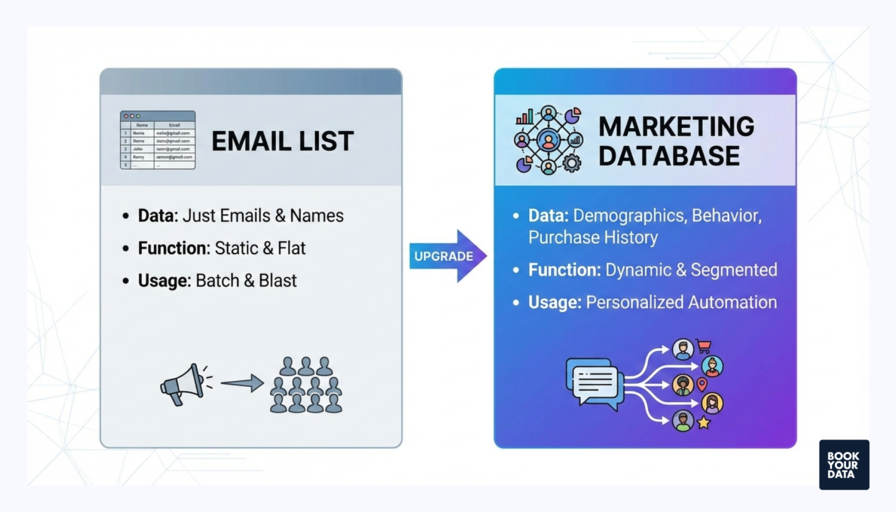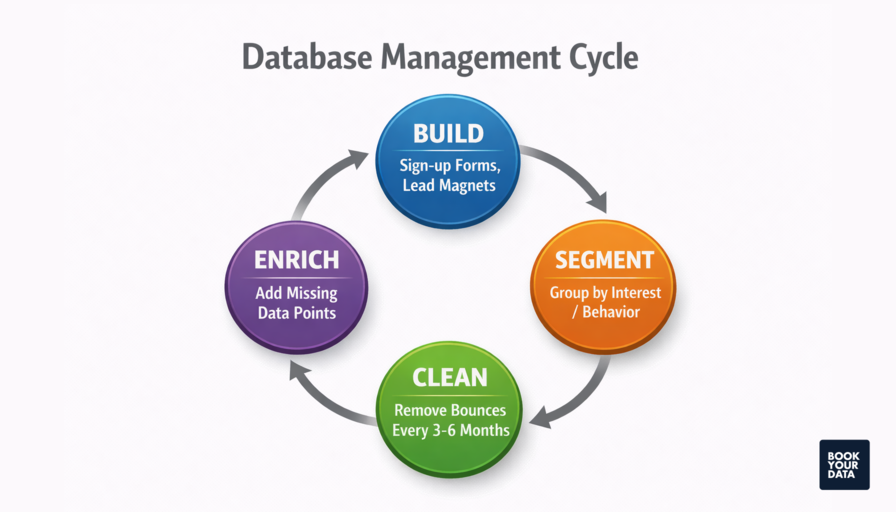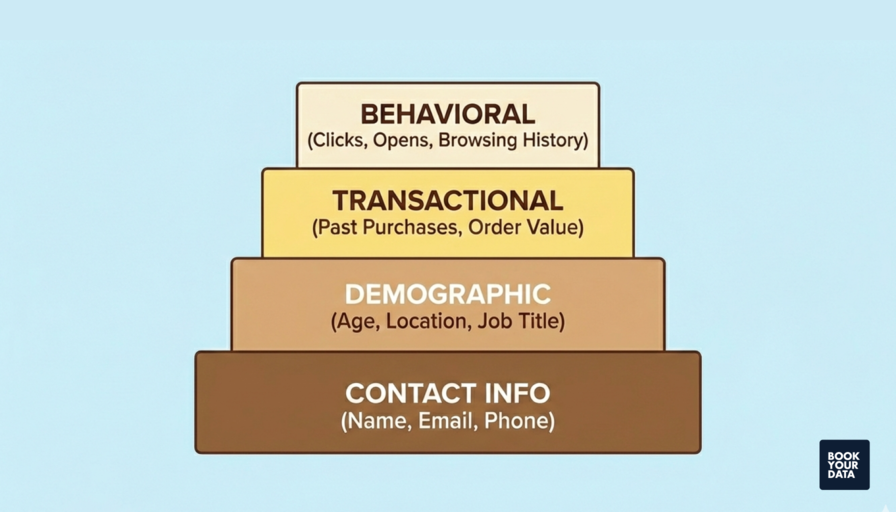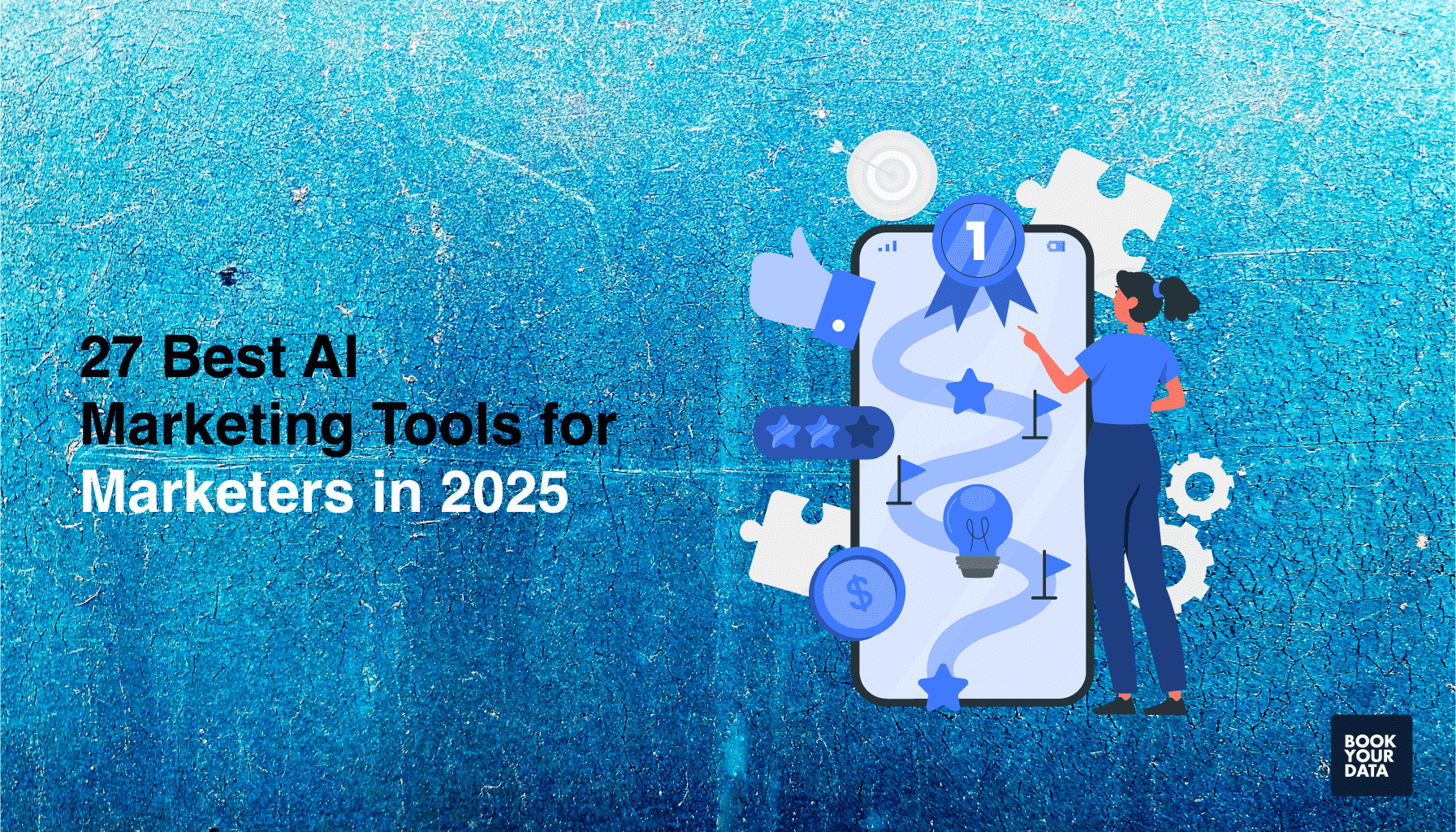How to Build and Grow Your Email Marketing Database in 2026: A Step-By-Step Guide
An email marketing database is a structured collection of email addresses and related subscriber information used to send targeted marketing campaigns. The database includes contact details, demographics, preferences, purchase history, and behavioral data. An email marketing database is important for businesses since it helps with segmentation and personalized communication, measurable results, targeted marketing, email compliance, and customer relationships.
The ways to build and grow your email marketing database include designing engaging landing pages, using high-converting signup forms, considering email segmentation, providing valuable content or incentives, identifying your audience, utilizing lead magnets, and creating online forms.
To manage your email marketing database, use permission-based opt-in, create an email sunset policy, clean your email database, add relevant tags, name your email lists, enrich your data, ensure compliance with marketing laws and regulations, offer transparent unsubscribe options, and implement safety measures.
BookYourData stands out as the best email marketing database due to its 97% data accuracy guarantee, real-time email verification, and access to over 250 million verified B2B contacts worldwide. The platform offers flexible pay-as-you-go pricing, GDPR and CCPA compliance, and advanced filtering options for precise audience targeting.
What is an email marketing database?

An email marketing database is a structured collection of email addresses and related subscriber information used to send targeted marketing campaigns. This database may include demographic data, contact lists, preferences, browsing history, and even records of past purchases.
It is not like a basic email list that simply contains email addresses, but an email marketing database is more comprehensive and dynamic. An email marketing database supports segmentation, enrichment, and compliance to help businesses in advanced targeting and automation. This means companies can organize contacts into meaningful groups based on characteristics like age, location, interests, or buying behaviour.
The value of an email marketing database lies in personalization. It allows businesses to keep track of recipients' preferences and helps to understand their needs and behaviors better. Marketers who have access to detailed subscriber information can craft messages that feel relevant rather than generic. This leads to higher open rates, better engagement, and stronger customer relationships.
Anyone can build a quality database by collecting information ethically through website sign-up forms, purchase processes, and other opt-in methods. An email database is not something created once and forgotten about, but regular cleanups are important to keep it useful. Marketers who need to maintain accurate, up-to-date records make sure campaigns reach the right inboxes and deliver meaningful results.
Why is an email marketing database important for businesses?

An email marketing database is important for businesses since it helps with segmentation and personalized communication, measurable results, targeted marketing, email compliance, and customer relationships.
Segmentation and personalized communication
An email marketing database allows businesses to divide their audience into smaller groups based on shared characteristics like age, location, interests, or purchase history. Businesses can easily create personalized messaging using an email template for smaller subsets of their customer database by grouping similar customers together. This approach makes sure that recipients receive content tailored to their specific needs and preferences.
Measurable results
An email marketing database has the ability to track and measure campaign performance with precision. Email marketing is one of the most measurable marketing tactics which allows businesses to track everything from who opened and clicked their campaigns to where subscribers live and which links they clicked.
Targeted marketing
A well-maintained email marketing database helps businesses send the right message to the right people at the right time. Businesses must send highly targeted emails to specific customers, and the message becomes a lot more relevant, and conversion rates will increase. They can also craft campaigns based on customer behaviour, purchase history, and preferences.
Email compliance
Businesses need to maintain a proper email marketing database to meet legal requirements such as GDPR, CAN-SPAM, and CASL. Email compliance refers to the adherence to laws and regulations that govern the sending of commercial emails, which protect consumers from spam, fraudulent messages, and privacy violations. A structured database helps businesses track consent records, manage unsubscribe requests, and honour opt-out preferences.
Customer relationships
An email marketing database builds and nurtures long-term customer relationships. Email allows businesses to establish and nurture relationships with customers through regular communication, share valuable content, and keep them informed about the latest offerings, promotions, and updates. Businesses can send personalized thank-you messages, birthday offers, and relevant product recommendations by maintaining detailed records of customer interactions and preferences.
Comparison table of email marketing database providers
The table below contains a list of major email marketing database providers, their key features, data accuracy, and compliance.
What types of information are stored in an email marketing database?
The types of information that are stored in an email marketing database include contact details, demographic details, preferences and interests, segmentation data, purchase behavior, behavioral data, and opt-out information.
How to build your email marketing database?

To build and grow your email marketing database, consider factors like designing engaging landing pages, using high-converting signup forms, considering email segmentation, providing valuable content or incentives, identifying your audience, utilizing lead magnets, and creating online forms.
The factors to build your email marketing database are mentioned below.
- Design engaging landing pages: A well-designed landing page captures visitor attention and encourages email signups. The page should have a clear headline, compelling copy, and a prominent call-to-action button that guides visitors toward subscribing.
- Use high-converting signup forms: Signup forms have to be simple and ask for less information, such as name and email address. The shorter forms increase the likelihood of visitors completing the subscription process.
- Consider email segmentation: Organize subscribers into groups based on demographics, interests, or behaviour to allow businesses to send more relevant content. Segmentation improves engagement rates and helps maintain a healthy subscriber list.
- Provide valuable content or incentives: Offer something of value to encourage people to share their email addresses. Discounts, exclusive content, or early access to products motivate potential subscribers to join the mailing list.
- Identify your audience: It is important to understand who the ideal subscriber is, as it helps create messaging that resonates. Businesses should define their target market before launching any email collection campaigns.
- Utilize lead magnets: Lead magnets such as ebooks, checklists, templates, or free guides attract subscribers by providing immediate value in exchange for contact information.
- Create online forms: A business must place signup forms across websites, blogs, and social media profiles to increase opportunities to capture email addresses and grow the database consistently.
How to grow your email marketing database?
To grow your email marketing database, improve website performance, offer value to your subscribers, offer incentives, use social media platforms effectively, engage in collaborations, and develop referral programs.
Improve website performance
A fast-loading and mobile-friendly website creates a positive user experience that encourages visitors to stay longer and subscribe. Slow websites lead to high bounce rates and missed opportunities for capturing email addresses. Optimize page speed, create a responsive design, and place signup forms strategically across the site to help convert casual visitors into loyal subscribers.
Offer value to your subscribers
Provide consistent value to keep subscribers engaged and encourage them to remain on the mailing list. Valuable content includes educational articles, industry insights, how-to guides, and exclusive updates that address subscriber needs. Prospects that receive useful information regularly are more likely to share the content with others, naturally expanding the database through word-of-mouth recommendations.
Offer incentives
Incentives motivate potential subscribers to share their email addresses willingly. Common incentives include discount codes, free shipping offers, exclusive access to sales, or entry into competitions. These rewards create a sense of urgency and give visitors a compelling reason to subscribe immediately rather than leaving the website without taking action.
Use social media platforms effectively
Social media channels provide opportunities to promote email signups, reach wider audiences, and create an email list. Businesses can share links to landing pages, run contests that require email registration, and create engaging posts that highlight the benefits of subscribing. Platforms like Facebook, Instagram, and LinkedIn help drive targeted traffic toward email signup forms.
Engage in collaborations
Partnering with complementary brands or industry influencers exposes the business to new audiences who are interested in subscribing. An email search engine can help identify potential partners by providing accurate contact information for major decision makers. Co-hosted webinars, guest blog posts, and joint promotions allow both parties to share their subscriber bases. Collaborations build credibility and introduce the brand to potential subscribers who already trust the partner organization.
Develop referral programs
Referral programs turn existing subscribers into brand advocates by rewarding them for bringing in new signups. Businesses must offer discounts, freebies, or loyalty points for successful referrals to encourage subscribers to spread the word. This strategy utilizes the trust that exists between friends and colleagues, making new subscribers more likely to engage with future email campaigns.
What are the ways to manage your email marketing database?
The ways to manage your email marketing database include using permission-based opt-in, creating an email sunset policy, offering transparent unsubscribe options, and implementing safety measures.
The ways to manage your email marketing database are mentioned below.
- Use permission-based opt-in: Collect email addresses only from individuals who have explicitly agreed to receive communications, to providea high-quality database, and reduces spam complaints. Double opt-in methods add an extra layer of confirmation and verify that subscribers genuinely want to receive emails.
- Create an email sunset policy: A sunset policy removes subscribers who have not engaged with emails over a specific period, helps to maintain list health, and improves deliverability rates. This approach also reduces costs by eliminating contacts who no longer provide value to marketing efforts.
- Clean your email database: Regular cleaning removes invalid, duplicate, and inactive email addresses, which reduces bounce rates and protects sender reputation. Businesses should schedule database cleaning at least quarterly to maintain optimal performance.
- Add relevant tags: Tags help categorize subscribers based on their interests, behaviours, or demographics, which makes it easier to send targeted and personalized campaigns. Consistent tagging practices make sure that marketing teams can quickly filter and segment contacts for specific promotions.
- Name your email lists: Clear and descriptive list names help organize subscribers efficiently and reduce confusion when managing multiple campaigns. A standardized naming convention makes it simpler for team members to locate and use the correct lists.
- Enrich your data: Add additional information such as job titles, company names, or preferences to maximize personalization capabilities and improve campaign relevance. Enriched data allows more precise segmentation and helps craft messages that resonate with specific subscriber groups.
- Ensure compliance with marketing laws and regulations: Follow regulations like GDPR and CAN-SPAM to protect the business from legal penalties, build subscriber trust, and verified email lists. Another strategy is to maintain detailed records of consent and data processing activities that show accountability and transparency.
- Offer transparent unsubscribe options: Businesses must provide easy-to-find unsubscribe links, respect subscriber preferences, and maintain a positive brand reputation. A simple one-click unsubscribe process reduces frustration and prevents subscribers from marking emails as spam.
- Implement safety measures: Secure the database with encryption, access controls, and regular backups to protect sensitive subscriber information from breaches and unauthorised access. Regular security audits help identify vulnerabilities and make sure that data protection standards remain up to date.
Why is BookYourData considered the best email marketing database?
BookYourData is considered the best email marketing database because it offers an industry-leading 97% data accuracy guarantee to connect businesses with valid and active contacts. The platform provides access to over 250 million verified B2B contacts across more than 200 countries, which makes it suitable for both local and international marketing campaigns.

BookYourData uses an advanced 8-step real-time verification process that validates every email address before delivery, reduces bounce rates, and protects sender reputation. The pay-as-you-go pricing model removes the need for expensive subscriptions, and credits never expire, which allows businesses to purchase data according to their specific needs. The platform offers over 100 search filters like job title, industry, company size, and location, enabling precise targeting for highly personalised outreach. BookYourData maintains full compliance with GDPR and CCPA regulations to make sure that all data is collected ethically and legally.
What is the difference between an email list and email marketing database?
The difference between an email list and an email marketing database is that an email list is a simple collection of email addresses gathered from subscribers, while an email marketing database is a complete system that stores additional information such as demographics, purchase history, preferences, and behavioral data. The free email lists allow advanced segmentation and personalization, whereas an email list offers limited targeting capabilities.
Can I buy an email marketing database?
Yes, you can buy an email marketing database from reputable data providers like BookYourData, ZoomInfo, or Cognism, but it is important to choose a provider that offers verified, accurate, and compliant data. Purchased databases must align with GDPR and CAN-SPAM regulations to avoid legal issues and protect sender reputation.
Which industries can benefit from email database marketing?
The industries that benefit from email database marketing include healthcare, real estate, finance, technology, retail, education, manufacturing, legal services, and hospitality. B2B and B2C businesses both use email databases to reach targeted audiences, nurture leads, and drive conversions. Any industry that relies on customer communication can benefit from email marketing.
How does data enrichment improve an email marketing database?
The data enrichment improves an email marketing database by adding valuable information such as job titles, company size, industry, location, and behavioral insights to existing contact records. This additional data allows more precise segmentation, better personalization, and highly targeted campaigns that resonate with specific audience groups, which increases engagement and conversion rates.
How do you use email verification in an email marketing database?
You use email verification in an email marketing database by running contact lists through verification tools that check for invalid, inactive, or misspelled email addresses. This process identifies and removes problematic contacts before campaigns are sent, reduces bounce rates, protects sender reputation, and ensures that marketing messages reach real, active recipients.
How to maintain data quality in an email marketing database?
To maintain data quality in an email marketing database, regularly clean the list by removing duplicates, verifying email addresses, updating outdated contact information, and monitoring engagement metrics. Businesses must also implement double opt-in processes, conduct periodic audits, and use reliable data enrichment tools to keep records accurate and for email verification.
How can list-building services improve an email marketing database?
The list-building services can improve an email marketing database by providing access to verified, targeted contacts that match specific criteria such as industry, job title, or location. These services help businesses expand their reach, acquire high-quality leads, and save time on manual prospecting, which leads to a larger and more relevant subscriber base for marketing campaigns.
How to create a database for email marketing?
To create a database for email marketing, start by collecting email addresses through website signup forms, landing pages, lead magnets, and social media campaigns. Businesses should choose a reliable email marketing platform, organize contacts into segments, add relevant data fields, and ensure compliance with privacy regulations like GDPR and CAN-SPAM from the start.
Why use an email address database for email marketing?
You must use an email address database for email marketing because it provides organized access to subscriber information, allows targeted messaging, and supports personalized campaigns. The database allows businesses to segment audiences, track engagement, measure campaign performance, and build lasting customer relationships that drive conversions and increase revenue over time.
How often should you clean your email list?
You should clean your email listat least once every three to six months to maintain optimal performance and deliverability. Businesses with high email volume or rapid list growth may need monthly cleaning. Regular list hygiene removes inactive subscribers, invalid addresses, and hard bounces to make sure that campaigns reach engaged and genuine recipients.
[CTA1]











